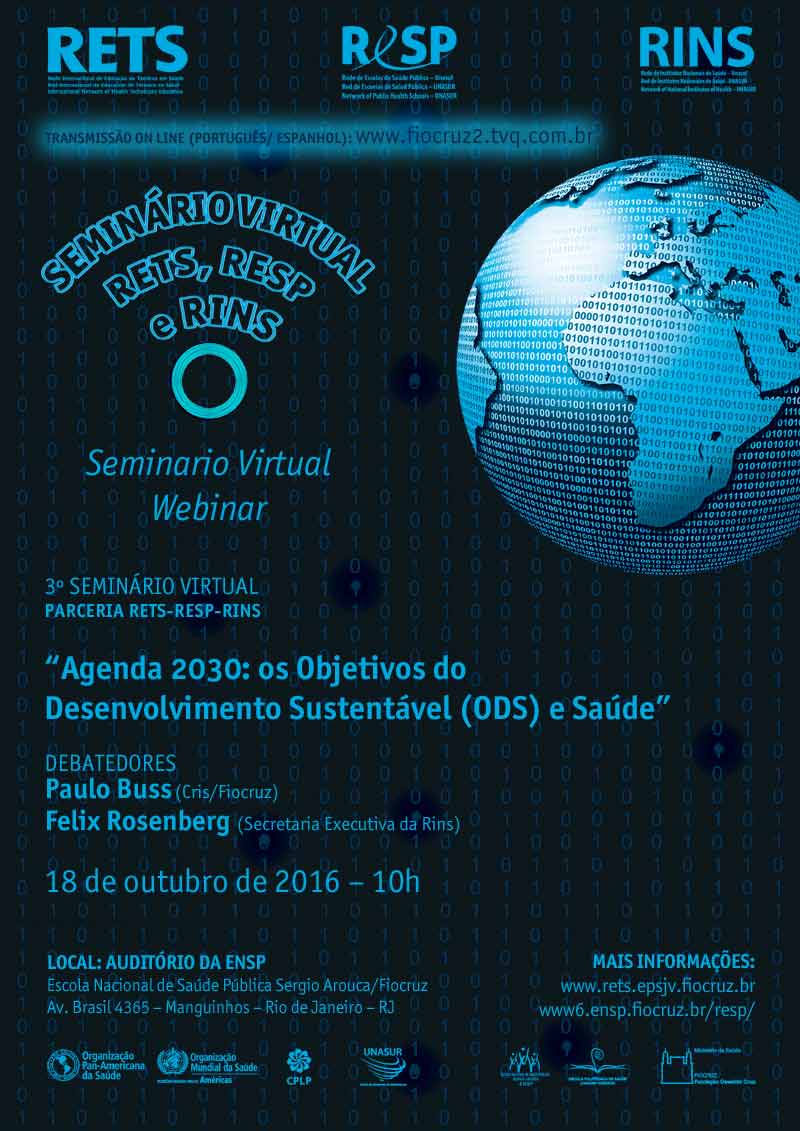Virtual Seminar will discuss Agenda 2030, the Sustainable Development Goals (SDG) and Health
Notícia publicada em:
- 11 de Outubro de 2016
 The Agenda 2030 of the United Nations and the Sustainable Development Goals will be the theme of the third Virtual Seminar of the International Network of Health Technicians Education (RETS), which is organized in partnership with the Network of Schools of Public Health (RESP) and the Network of National Institutes of Health (RINS). To discuss the topic, the former President and current coordinator of the Centre for International Relations at Fiocruz, Paulo Machiori Buss and the Executive Secretary of RINS, Felix Rosenberg, will be attending.
The Agenda 2030 of the United Nations and the Sustainable Development Goals will be the theme of the third Virtual Seminar of the International Network of Health Technicians Education (RETS), which is organized in partnership with the Network of Schools of Public Health (RESP) and the Network of National Institutes of Health (RINS). To discuss the topic, the former President and current coordinator of the Centre for International Relations at Fiocruz, Paulo Machiori Buss and the Executive Secretary of RINS, Felix Rosenberg, will be attending.The debate, which will be mediated by Geandro Ferreira, coordinator of International Cooperation of the Polytechnical School of Health Joaquim Venâncio (EPSJV/Fiocruz), will take place on October 18th, from 10 am (Brasília time), in the Auditorium of ENSP and will be broadcast live on the WEB, with simultaneous translation into Spanish. Those interested can follow the event in person or via Internet, through the link: www.fiocruz2.tvq.com.br
UN Agenda 2030 for sustainable development – ‘the future we want ‘
‘Agenda2030’ was the name given to the commitment made by heads of State and Government and senior representatives, gathered, from September 25th to 27th 2015, at the headquarters of the United Nations (UN) in New York. On that occasion, in which the UN celebrated 70 years of existence, it was being set a new global development agenda post-2015, the year that marked the end of the deadline for achieving the Millennium Development Goals (MDGs).
Agenda 2030 consists of 17 Sustainable Development Goals (ODS) and corresponding 169 targets (https://nacoesunidas.org/pos2015/agenda2030) and it proposes means of implementation that will allow the achievement of these goals and its targets.
According to the document, although the MDGs have provided an important framework for development and have resulted in significant progress in several areas, there was no equality in the processes and many countries, especially the least developed among them, were not reaching desired levels. The new Agenda, therefore, intends to complete what was not achieved and benefit, particularly the neediest populations.
The Signatories recognize that undertaking compliance with the Agenda requires a revitalized global partnership. They also reaffirm the need to work in a spirit of global solidarity, in particular solidarity with the poor and with people in vulnerable situations. The idea is that the implementation of all the Goals and targets will only be possible if Governments, the private sector, civil society, the United Nations system and other actors work in partnership in order to mobilize all available resources. The commitment also highlights that each country is the main responsible for its own economic and social development, and the more developed, among other things, should make an effort to mobilize financial resources, as well as to develop capabilities and provide the transfering, in favourable conditions, of environmentally appropriate technologies to poorer countries.
Access the final document of agenda post-2015 alongside or access in PDF format in Portuguese (click here) and in English (click here).
The Sustainable Development Goals (ODS)
Acesse the global goals by clicking on each of them:
Goal 1. End poverty in all its forms, everywhere
Goal 2. End hunger, achieving food security and nutrition improvement and promote sustainable agriculture
Goal 3. Ensure a healthy lifestyle and promote well-being for all, in all ages
Goal 4. Ensure inclusive and equitable and quality education, and promote opportunities for lifelong learning for all
Goal 5. Achieve gender equality and empower all women and girls
Goal 6. Ensure the availability and sustainable management of water and sanitation for all
Goal 7. Ensure reliable, sustainable, modern and affordable access to energy for all
Goal 8. Promote sustained, inclusive and sustainable economic growth, full and productive employment and decent work for all
Goal 9. Building resilient infrastructure, promoting inclusive and sustainable industrialization and fostering innovation
Goal 10. Reduce inequality within countries and among them
Goal 11. Make cities and human settlements safe, inclusive, sustainable and resilient
Goal 12. Ensure standards of sustainable production and consumption
Goal 13. Take urgent action to combat climate change and its impacts
Goal 14. Conservation and sustainable use of the oceans, the seas and marine resources for sustainable development
Goal 15. Protect, restore and promote sustainable use of terrestrial ecosystems, sustainably manage forests, combat desertification, arrest and reverse land degradation and halt the loss of biodiversity
Goal 16. Promote peaceful and inclusive societies to sustainable development, providing access to justice for all and to build effective, responsible and inclusive institutions at all levels
Goal 17. Strengthen the means of implementation and revitalize the global partnership for sustainable development
Material for reference and consultation:
- Global governance and Health: Health on the Development Agenda of the United Nations 2030
- Sustainable development and global governance in health – From Rio + 20 to Sustainable Development Goals (SDG) post-2015 (Paulo Marchiori Buss, José Roberto Ferreira Roberto Ferreira, Claudia Hoirisch, Álvaro H. Matida – 2012)
- Health in post-2015 Development Agenda of the United Nations (Paulo Marchiori Buss, Danielly de Paiva Magalhães, Andréia Faraoni Freitas Setti, Edmundo Gallo, Francisco de Abreu Franco Netto, Jorge Mesquita Huet Machado, Daniel Forsin Buss)
Source: http://www.rets.epsjv.fiocruz.br/




